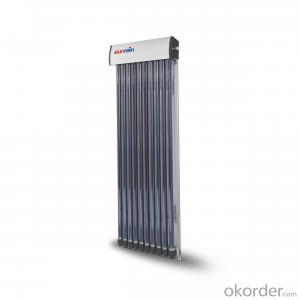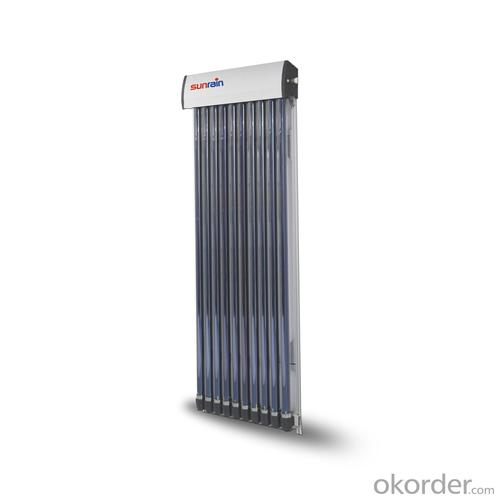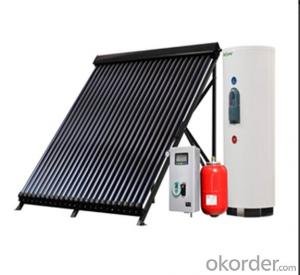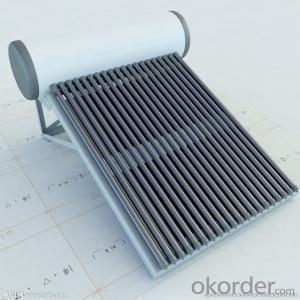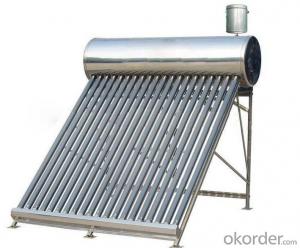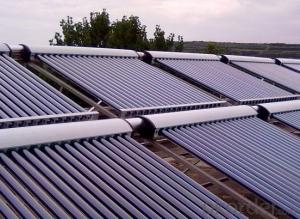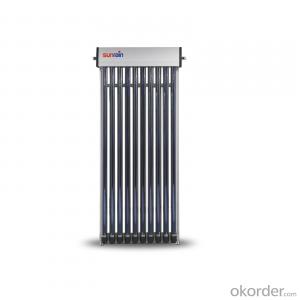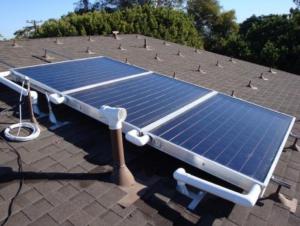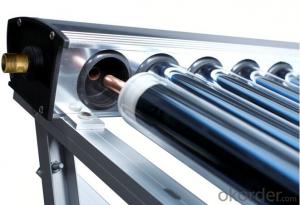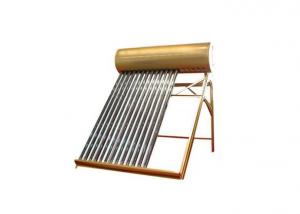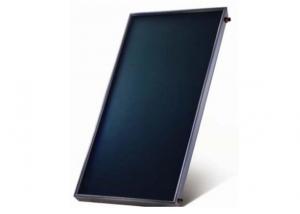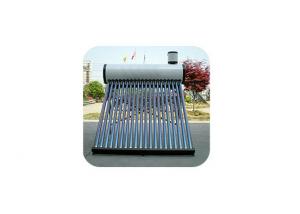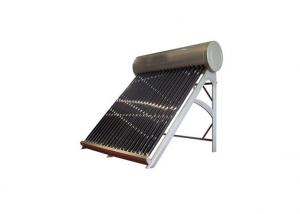Heat Pipe Collector R2 Solar Water Heater for Bird Bath
- Loading Port:
- China Main Port
- Payment Terms:
- TT OR LC
- Min Order Qty:
- -
- Supply Capability:
- -
OKorder Service Pledge
OKorder Financial Service
You Might Also Like
* High performance evacuated tube collectors
* Can be mounted free-standing or on a pitched roof, easy to install, simple roof fixings
* Heat pipe - offer low maintenance
* No water in the vacuum tubes, no freezing problem in winter, can be used in cold area. One broken tube will not affect the function of the system.
* 3 years warranty, 20+ years lifespan
* Market leading efficiency/output
* Triple layer selective absorber coating, absorption coefficient >94%
* Evacuated tube outer tube thickness >1.8mm
* 24mm high conductivity heat pipe condenser, Nick-coated condenser surface.
* Aluminum frame, strong structure, light weight.
* High and constant pressure of polyurethane foaming technology ensure the outstanding insulation quality.
* Angle adjustable flat roof frame
- Q: How does the efficiency of a solar water heater change over time?
- The efficiency of a solar water heater generally remains relatively consistent over time, as long as the system is properly maintained and the components are kept in good working condition. However, there may be a slight decrease in efficiency over the years due to factors such as dust accumulation on the solar panels, wear and tear of the system, or aging of the components. Regular maintenance and cleaning can help maintain the efficiency of a solar water heater over an extended period.
- Q: How does the temperature of the water impact the performance of a solar water heater?
- The temperature of the water has a significant impact on the performance of a solar water heater. Higher water temperatures generally result in better efficiency and performance of the system. Solar water heaters operate by utilizing the energy from the sun to heat the water. The higher the temperature of the water, the less energy is required to bring it to the desired temperature. This means that a solar water heater can heat the water more efficiently when the initial temperature is higher. Additionally, higher water temperatures allow for a faster transfer of heat from the solar collector to the water. This is because the temperature difference between the collector and the water is greater, which facilitates more efficient heat transfer. On the other hand, colder water temperatures can negatively impact the performance of a solar water heater. When the water is cold, the system needs to work harder and for a longer period of time to heat it to the desired temperature. This can result in reduced efficiency and longer heating times, especially during colder seasons or in regions with low solar radiation. It is worth noting that solar water heaters are designed to work in a variety of climates and water temperatures. They are equipped with insulation and other features to minimize heat loss and maximize efficiency. However, the performance of the system can still be influenced by the temperature of the water. In conclusion, the temperature of the water directly affects the performance of a solar water heater. Higher water temperatures lead to improved efficiency and faster heating times, while colder water temperatures can reduce efficiency and prolong heating times.
- Q: How does a solar water heater perform in areas with high levels of rainfall?
- A solar water heater can still perform effectively in areas with high levels of rainfall. While rainfall may reduce the amount of direct sunlight reaching the solar panels, modern solar water heaters are designed to be efficient even in cloudy or rainy conditions. Additionally, the water heating system can be designed to store enough hot water to compensate for days with limited sunlight. Therefore, a solar water heater can still provide hot water in areas with high rainfall, albeit with potentially slightly reduced efficiency.
- Q: How does a solar water heater contribute to reducing carbon emissions?
- A solar water heater contributes to reducing carbon emissions in several ways. Firstly, unlike traditional water heaters that rely on fossil fuels such as natural gas or coal, solar water heaters utilize the energy from the sun to heat water. This means they do not rely on non-renewable sources of energy and do not produce carbon dioxide emissions during operation. Secondly, solar water heaters are highly efficient in converting solar energy into heat. By harnessing the power of the sun, they can heat water to high temperatures without consuming any additional energy. This reduces the demand for electricity or gas-powered water heaters, which in turn leads to a decrease in carbon emissions associated with the production and use of these fossil fuels. Moreover, solar water heaters also have a longer lifespan compared to conventional water heaters. They require minimal maintenance and have fewer mechanical parts that can wear out or break down. This results in reduced manufacturing and disposal of water heater units, further reducing the carbon footprint associated with their production and end-of-life disposal. Additionally, the installation of solar water heaters can be incentivized through government programs or renewable energy subsidies. This encourages homeowners and businesses to adopt these environmentally friendly systems, leading to a greater adoption of solar water heaters and subsequently reducing carbon emissions on a larger scale. In summary, solar water heaters contribute to the reduction of carbon emissions by utilizing renewable energy from the sun, reducing the reliance on fossil fuels, improving energy efficiency, and promoting sustainable practices.
- Q: Can a solar water heater be used in areas with limited access to building permits?
- Yes, a solar water heater can be used in areas with limited access to building permits. Solar water heaters are generally considered to be passive solar systems and may not require a building permit in some locations. However, it is important to check the local regulations and consult with local authorities to ensure compliance with any applicable restrictions or guidelines.
- Q: Can a solar water heater be used in areas with limited access to backup heating systems?
- Yes, a solar water heater can be used in areas with limited access to backup heating systems. Solar water heaters use sunlight to heat water, so as long as there is sufficient sunlight available, they can provide hot water without the need for backup heating systems. However, it is important to consider the local climate and weather conditions before installing a solar water heater as it may not be as effective in areas with low sunlight or extreme cold temperatures.
- Q: Can a solar water heater be used in areas with strict historic preservation regulations?
- Yes, a solar water heater can be used in areas with strict historic preservation regulations. As long as the installation of the solar water heater does not compromise the historical integrity of the building or violate any preservation guidelines, it can be incorporated into the existing infrastructure. It is crucial to consult with local preservation authorities and obtain any necessary permits or approvals before proceeding with the installation.
- Q: How does the design of solar panels affect the performance of a solar water heater?
- The design of solar panels plays a crucial role in determining the performance of a solar water heater. The efficiency and effectiveness of the panels in capturing and converting sunlight into usable energy directly impact the heating capabilities of the system. Factors such as the type of solar panel, its size, orientation, and tilt angle all influence the amount of sunlight absorbed and the thermal energy transferred to the water. Therefore, a well-designed solar panel system can significantly enhance the performance and overall efficiency of a solar water heater.
- Q: Can a solar water heater be used in areas with limited sunlight?
- While a solar water heater relies on sunlight to generate heat, it can still be used in areas with limited sunlight. However, its efficiency and performance may be affected due to reduced sun exposure. In such areas, additional heating methods or backup systems might be necessary to ensure a consistent supply of hot water.
- Q: How does the angle of solar panels affect the performance of a solar water heater?
- The performance of a solar water heater is heavily influenced by the angle of the solar panels. The absorption of sunlight by the panels is directly impacted by their angle, which directly affects the efficiency and effectiveness of the solar water heater. It is ideal to install solar panels at an angle that maximizes the absorption of solar radiation. This angle should be calculated based on the geographical location of the installation and the tilt of the Earth's axis. The general guideline is to align the solar panels perpendicular to the sun's rays during the peak solar hours of the day. When the solar panels are correctly angled, they are able to absorb the maximum amount of sunlight. This absorbed sunlight is then converted into thermal energy, efficiently heating the water. However, if the solar panels are not angled optimally, they may not receive the full intensity of sunlight, resulting in a decrease in the performance of the solar water heater. If the angle of the solar panels is too steep, the sunlight may be reflected off the surface, reducing the amount of energy absorbed. Conversely, if the angle is too shallow, the panel may not receive the full intensity of sunlight, resulting in lower energy conversion. Moreover, the angle of the solar panels also impacts the system's performance during different seasons. For instance, in winter when the sun is lower in the sky, the angle of the solar panels may need to be adjusted to ensure maximum absorption of sunlight. Similarly, during the summer months, the angle may need to be adjusted to prevent overheating of the solar water heater. In conclusion, the angle of solar panels has a significant impact on the performance of a solar water heater. Properly aligning the panels at an optimal angle guarantees the maximum absorption of solar radiation, leading to efficient and effective water heating.
Send your message to us
Heat Pipe Collector R2 Solar Water Heater for Bird Bath
- Loading Port:
- China Main Port
- Payment Terms:
- TT OR LC
- Min Order Qty:
- -
- Supply Capability:
- -
OKorder Service Pledge
OKorder Financial Service
Similar products
Hot products
Hot Searches
Related keywords
